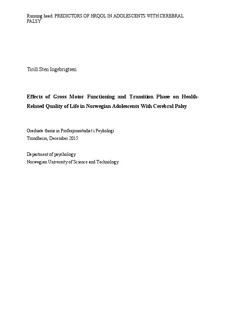| dc.contributor.advisor | Reinfjell, Trude | |
| dc.contributor.advisor | Hjemdal, Odin | |
| dc.contributor.author | Ingebrigtsen, Tirill Sten | |
| dc.date.accessioned | 2016-08-19T09:24:01Z | |
| dc.date.available | 2016-08-19T09:24:01Z | |
| dc.date.issued | 2015 | |
| dc.identifier.uri | http://hdl.handle.net/11250/2400015 | |
| dc.description.abstract | Adolescents with cerebral palsy meet great challenges in the transition from childhood
to adulthood. As young adults they lag behind their able-bodied peers in housing,
employment and intimate relationships, and their health-related quality of life (HRQOL) is
more impaired than in healthy individuals. Previous studies have yielded evidence for gross motor functioning as a predictor for impaired HRQOL for individuals with cerebral palsy. In
this study we therefore examine the predictability of gross motor functioning, as measured by the Gross Motor Function System (GMFCS) and transition phase, as measured by the
Rotterdam Transition Profile (RTP) on HRQOL, as measured by the Pediatric Quality of Life Inventory 4.0 (PedsQL). 57 Norwegian adolescents between the ages of 15 to 17 years drawn from the Norwegian Cerebral Palsy Register (CPRN) participated in the current study. Results showed significant effects of the GMFCS as a predictor for HRQOL. Transition phase had very little effect on HRQOL. It is suggested that the RTP is more suitable for measuring older subjects. | nb_NO |
| dc.language.iso | eng | nb_NO |
| dc.publisher | NTNU | nb_NO |
| dc.subject | Pediatric Quality of Life Inventory | nb_NO |
| dc.subject | Rotterdam Transition Profile | nb_NO |
| dc.subject | Gross Motor Function System | nb_NO |
| dc.subject | celebral palsy | nb_NO |
| dc.subject | adolescence | nb_NO |
| dc.title | Effects of gross motor functioning and transition phase on health related quality of life in Norwegian adolescents with cerebral palsy | nb_NO |
| dc.type | Master thesis | nb_NO |
| dc.subject.nsi | VDP::Social science: 200::Psychology: 260 | nb_NO |
